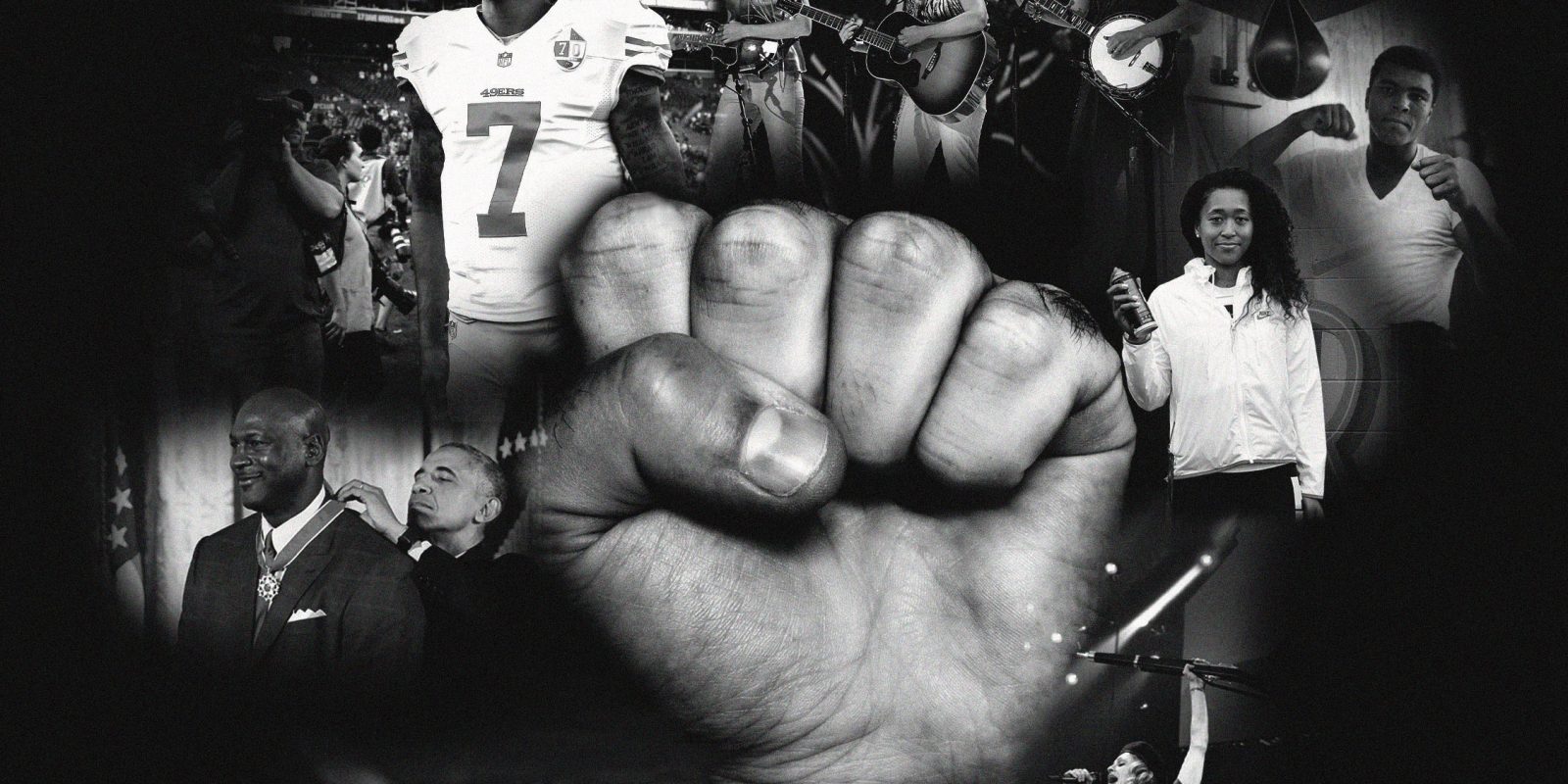
Illustration by Martin Nandwa
When Celebrities Talk …
Kristie Bunton examines the ethics of athletes and entertainers speaking out.
Rap artist Nicki Minaj created a media stir with a viral tweet about her cousin’s friend in Trinidad who had gotten the Covid-19 vaccine. Her Twitter post said the unidentified man’s testicles swelled, making him impotent, and his fiancée dumped him.
MSNBC political commentator Joy Reid expressed concern for Minaj’s 22 million Twitter followers, arguing the musician had used her platform “to put people in the position of dying from a disease they don’t have to die from.”
Addressing a comment directly to Minaj in her commentary, Reid added: “As somebody who is your fan, I am so sad you did that.”
Two days after Minaj’s tweet, Trinidad and Tobago’s health minister said the claim had been investigated and debunked.
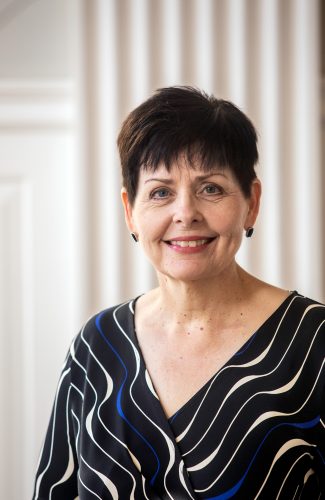
Kristie Bunton is dean of the Bob Schieffer College of Communication and author of Having Their Say: Athletes and Entertainers and the Ethics of Speaking Out. Photo by Mark Graham
In her book Having Their Say: Athletes and Entertainers and the Ethics of Speaking Out (McFarland & Co., 2021), Kristie Bunton, dean of TCU’s Bob Schieffer College of Communication, looks at the ethical obligations of famous athletes and entertainers for what they say and how it may affect public opinion.
Bunton’s book also urges news consumers to be judicious about their sources.
She said she doesn’t oppose celebrities voicing their opinions; in fact, Bunton suggests to students that the more voices society can muster, the greater the power and promise of the free expression of competing ideas.
However, she also teaches that reporters and news consumers have an ethical obligation to the truth.
Social media platforms are testing humanity’s ethics like never before because those platforms have become omnipresent in our lives, Bunton said, noting in her book: “Many of us rarely tuck our smartphones and tablets farther away than our pockets, tote bags and bedside tables so we can check digital content incessantly during our days — and nights.”
Bunton doesn’t find fault with social media or related communication-enabling technologies. In the United States, 82 percent of the population had a social networking profile in 2021, according to Statista Research & Analysis. Worldwide, more than 3.6 billion people used social media in 2020, a number expected to reach 4.4 billion by 2025, the international market research firm found.
And people who typically communicate via social media can enlighten and encourage everyone to seek a better world, she writes in her book. “The more communication tools we have to speak out and wisely share a panoply of human views and experiences, the better off we all will be in seeking a common good.”
Yet she found that these powerful communication tools — especially social media platforms favoring short bursts of opinion and rapid likes or dislikes over sustained discourse and careful argument — also present great power to harm and offend, whether with untruthful or deceitful content, ill-considered views or disrespect for human dignity.
Outside the Lanes
Though the channels for speaking out may be new, the United States has long spotlighted celebrities’ takes on social issues and politics. In 1920, Republican presidential nominee Warren Harding recruited Broadway and film stars to campaign for him. In the 1930s and 1940s, Democrat Franklin D. Roosevelt’s campaigns used film and music stars such as Humphrey Bogart, Judy Garland, Rita Hayworth and Frank Sinatra.
When race and civil rights became the central issue of the 1960 campaign, John F. Kennedy persuaded iconic Black singer and actor Harry Belafonte and baseball legend Jackie Robinson to offer endorsements. In contrast, John Wayne endorsed Kennedy’s opponent, Richard Nixon, in the 1960 and 1968 elections.
Today, the practice of securing celebrity endorsements has become so commonplace that during the 2016 presidential campaign, the Los Angeles Times kept a celebrity endorsement tracker of which celebrities had raised funds, campaigned or written statements supporting candidates.
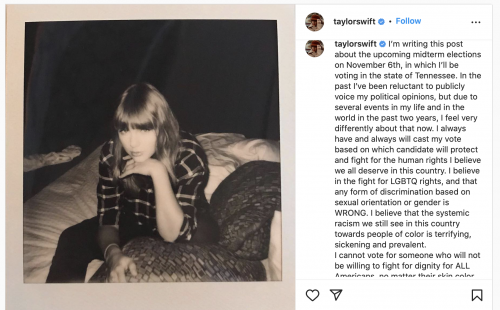
Kristie Bunton’s new book looks at celebrities, such as Taylor Swift, and how they have chosen to use their megaphones. Courtesy of Instagram
Armed with social media followers, today’s A-list entertainers compete with local and national news outlets in influence. When Taylor Swift decided to weigh in on the 2018 midterm elections, she told her 112 million Instagram followers who she would be voting for in her home state of Tennessee.
“In the past I’ve been reluctant to publicly voice my political opinions, but due to several events in my life and in the world in the past two years, I feel very differently about that now,” she wrote. “I cannot vote for someone who will not be willing to fight for dignity for ALL Americans, no matter their skin color, gender or who they love.”
Beyond politics, celebrities have often been ambassadors for social issues important to them, from Muhammad Ali’s and Jane Fonda’s opposition to the Vietnam War, to rock musician Bono’s efforts to fight poverty, to Olympic track star Allyson Felix’s push for women’s rights.
When international tennis champion Naomi Osaka declined to take part in a scheduled news conference in June 2021 for the French Open, the 23-year-old star was criticized and fined $15,000. Osaka said she suffers from anxiety before speaking to the media and revealed she has bouts of depression. Citing her mental health, she ultimately withdrew from the major tennis tournament.
How she did it is an indicator of the power celebrities like Osaka have. She explained her reasoning on Twitter to her 1.1 million followers. With social media, Osaka had the freedom to conduct her own news conference, on her terms. The news was picked up globally, and she was invited to write a guest column in Time magazine to further explain her decision.
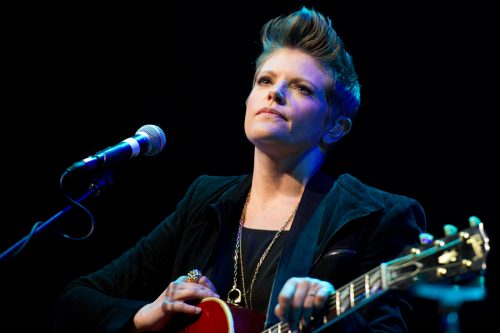
After Natalie Maines of the Dixie Chicks expressed her opposition to the Iraq War and President George W. Bush in a country music concert, the group faced fan backlash and threats. Photo Public Domain
Arguably, no public issue is connected as strongly to a subgroup of celebrities as racial injustice is with Black entertainers.
Celebrities of other races can choose to speak out about the police shooting of unarmed Black men or the kneeling of a white police officer on the neck of a Black man for nearly nine minutes. For Black entertainers, there’s often an obligation, said Leah Frazier, president of Dallas-based Think Three Media, a publicity firm whose diverse portfolio includes Black celebrities and businesses.
“There’s a silent expectation of the Black athlete or entertainer,” said Frazier, a Black woman. “If LeBron James went out and didn’t kneel, didn’t make a statement or didn’t wear anything on his jersey during the first game back after a murder, we are looking at him odd if he just went out there … in the middle of social unrest and just played basketball. Black athletes are automatically under the scope, whether they want to align themselves with the issues or not.”
When to Speak
In the United States, no rules or restrictions exist for celebrities who step beyond the talents that made them famous and speak out about political and social issues. The decision to speak — regardless of a celebrity’s race, ethnicity or gender — is regulated largely by their desire to protect their brand.
“Athletes or entertainers with a social media presence now have an audience that is so used to them being on demand when something happens that affects the community,” Frazier said. “Your followers are looking to you for responses. The issue is that if you’re attached to an organization and you choose to speak out in a way that is either in direct conflict or at a disadvantage to your organization, you now have your hands tied. There’s a tug-of-war. You want to speak out, but you need to secure the bag.”
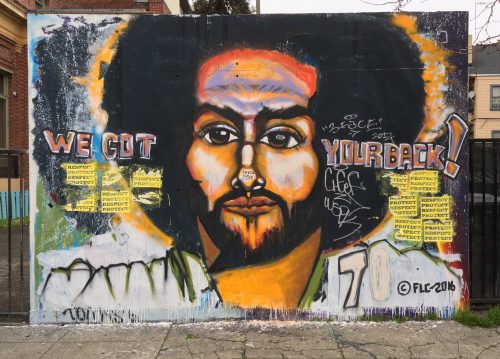
In her new book, Kristie Bunton analyzes several celebrity speakers, such as quarterback-turned-civil rights activist Colin Kaepernick. Photo Public Domain
Frazier said she and other publicists advise their clients that they have a personal brand outside of their organization. She tells them to understand their values and their nonnegotiable positions on important issues.
“If, in fact, something arises publicly that is in alignment with the values that you say are part of your personal brand, you almost have a duty to speak up on those issues,” Frazier said. “And in the wake of this explosion of cancel culture, you just can’t afford to not align yourself online with the things that your audience and your customers — or the people who are literally paying your bills — are telling you matter.”
And if the position runs counter to what the audience supports?
“As a publicist,” Frazier said, “I tell my client to keep your mouth shut.”
In her book, Bunton writes that speaking out only to enhance a reputation is questionable and not just on the celebrities’ part. The motives of publicists who push unqualified or uninformed celebrities to speak out is an ethical question worth examining, as are the motives of journalists who interview these public figures.
In many cases, news reporters interview athletes or entertainers about a pressing public issue rather than finding people who are affected by that issue.
What can ordinary people learn from the cases of celebrity athletes and entertainers who speak out? How can the general populace speak out ethically and with moral courage in their own spheres of influence?
“Few of us will find ourselves sharing political views with 112 million Instagram followers or chatting with a crowd from a concert stage,” Bunton writes. “However, we will find ourselves in situations on our jobs, in our schools, our churches, neighborhoods, Twitter feeds, Facebook pages and Instagram accounts when we might want to defy the expectations people have for our personal and professional roles to speak out about public issues important to us. And when we do so, we want to speak out effectively and ethically.”
Read an excerpt from Having Their Say
Introduction Having Their SayFrom Having Their Say: Athletes and Entertainers and the Ethics of Speaking Out © 2021 Kristie Bunton by permission of McFarland (McFarlandBooks.com).

Your comments are welcome
1 Comment
Insightful article that really makes you think about your own responsibility, even if you are not a celebrity.
Related reading:
Web Extras
Podcast: Beyonce, Intersectionality and Lynn Hampton
What is intersectionality? How does Beyonce represent it? What is feminism?
Research + Discovery
‘De Niro Method’ Tracks Actor’s Evolving Career
Film scholar R. Colin Tait looks at five decades of artistic accomplishment and how a star can contribute to a director’s vision.
Research + Discovery
Brandon Manning Examines Black Masculinity
His book Played Out: The Race Man in 21st Century Satire is an examination of inclusion and social justice.